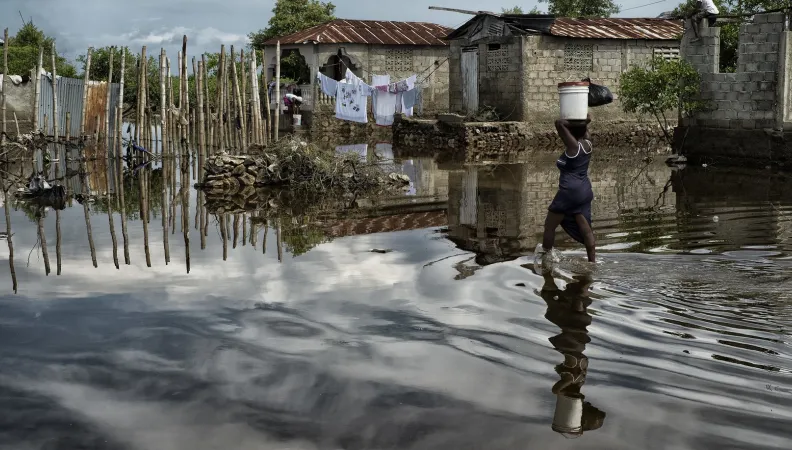Share the page
The Dangers Facing the world’s Small Island States – and how we can Help
Published on

With Small Island States facing rising sea levels and geographical isolation, they are faced with serious environmental, social and economic problems. How do the world’s wealthy countries provide support? AFD’s economist specializing in oceans tells us about the work AFD is already doing.
Small Island Developing States (SIDS) are a group of 39 Member States of UN regional commissions. What distinguishes from other countries?
Benjamin Coudert: While their economies vary considerably, SIDS share common structural vulnerabilities, along with vulnerabilities exacerbated by climate change. Indeed, they are small and poorly diversified economies (with low potential for economic diversification).
They are also remote from international markets, and highly dependent on international trade, meaning that they are highly exposed to external shocks. On top of this, there are problems of governance, capabilities, and capacities. Their demographic characteristics are also very different, each with their own social and economic challenges. These factors make the States structurally vulnerable to exogenous shocks, such as the health crisis in 2020 and the war in Ukraine.
Further reading: Passing Traditional Knowledge from Mother to Child, to Protect the Environment
SIDS are particularly vulnerable to biodiversity loss, because their terrestrial and marine ecosystems are fragile, and to the effects of climate change. Yet these States have the lowest greenhouse gas emissions (< 1% of global GHGs). They bear the brunt of natural disasters, which are increasing in frequency and intensity due to climate change.
AFD’s Innovation, Strategy and Research Department has calculated that the costs of a disaster amount to an average of 23% of the GDP of SIDS (the figure is even higher in the Pacific), against an average of 4.5% in other developing countries. This automatically increases their borrowing requirements to finance reconstruction works.
There is also a high level of debt in most SIDS. The majority of their public debt is external, owed to international donors, as their domestic debt market is limited and they lack access to foreign capital. This climate-debt trap highlights the marked double vulnerability of island States (macro-financial and climate change). This is especially the case for Pacific States.
The IPCC estimates that climate change will cost an average of 0.5% of GDP worldwide by 2030. But it could reach between 0.75% and 6.5% in the Pacific, and up to 5% in the Caribbean (20% by 2100).
Further reading: In Mauritius, 40 Years of Partnership for Water and Sanitation
How can such small economic actors make their voices heard among the “giants” of pollution (such as China, the EU, the USA and India)?
We should first remember that these small territories are in fact important maritime countries, due to the size of their territorial waters, which cover 28 times the area of their territory on average. But they struggle to have their specific vulnerabilities recognized faced with the “political giants”, the main global GHG emitters, and are constantly demanding climate justice. They also form a group in the UN negotiation forums, AOSIS (Alliance of Small Island States), and join forces with other groups (such as LDCs and the G77) to make their voice heard.
It is via these international conferences dedicated to SIDS that they can best express their needs. Three international conferences on SIDS launched by the UN resulted in the adoption of international texts: the Barbados Program of Action in 1994, the Mauritius Strategy in 2005, and the Samoa Pathway in 2014.
This 4th UN International Conference on SIDS is a rare opportunity (every ten years), as it enables these countries to draw attention to their specific vulnerabilities and their priority needs in terms of international support. The objective is to strengthen their resilience to the effects of climate change and keep them on track for the achievement of the SDGs. The final text that will be adopted at the conclusion of the conference, ABAS (Antigua and Barbuda Agenda for SIDS), will define the development program for SIDS for the coming decade.
How can France and AFD Group play a crucial role for SIDS?
To address all these vulnerabilities, AFD’s action in SIDS mobilizes its entire range of financial tools. This includes grants (for programs in the French Overseas Territories), loans with or without subsidies, and guarantees for various types of actors in the islands (public, private, and civil society organizations).
AFD has also recently developed tools and approaches that seem to be particularly suitable for operations in SIDS to address their vulnerabilities: debt suspension clauses when a climatic event occurs, “highly concessional” loans, referred to as such because they are allocated at attractive conditions with a long maturity (40 years), and contingency loans (or contingency lines), whose resources are made available following a climatic event.
New initiatives for SIDS are being prepared and are due to be announced at the third United Nations Ocean Conference (UNOC), in Nice in June 2025.
